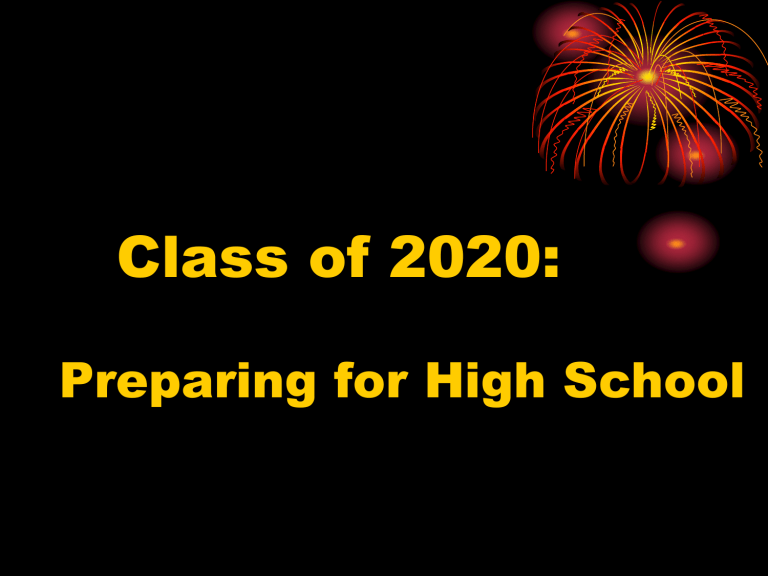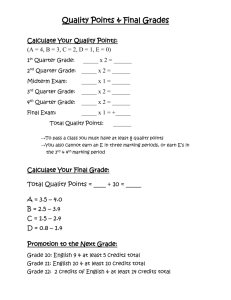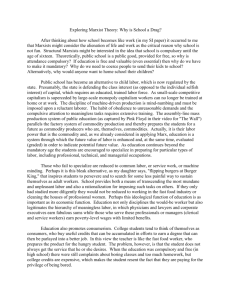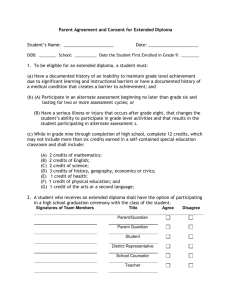Preparing for High School - Mt. Vernon Community School

Class of 2020:
Preparing for High School
Contact Information
• Nicole Johnson, 8 th Grade Counselor
• nicole.johnson@mvcsc.k12.in.us
• 317-485-3131 x1732
• Katherine Christoffersen, 6 th /7 th Grade
Counselor
• katherine.christoffersen@mvcsc.k12.in.us
• 317-485-3160 x2164
• Carey Cole, 6 th /7 th Grade Counselor
• carey.cole@mvcsc.k12.in.us
• 317-485-3160 x2162
What’s next?
• In six months your 8 th grade students will begin high school.
• In four years they will graduate from high school and enter…
• College
• Vocational training
• Apprenticeship programs
• Military
• Workforce
Statistics…
“Of the 30 fastest growing occupations in
America, half require a Bachelor's degree or more. By 2016, four out of every ten new jobs will require at least some advanced education or training.”
“90% of the fastest growing and best paying jobs require some post-secondary education.”
Policy Perspective: The Importance and Impact of
Graduation Rates. Alliance for Excellent Education,
December 2010
Indiana has found that:
• A rigorous high school academic curriculum is the single-most significant factor in determining a student’s success in college.
• Students who need to take some remedial coursework when they begin college are at a greater risk of dropping out.
Studies also indicate….
• The more rigorous a student’s high school curriculum, the more opportunities available to them after graduation:
• College acceptance
• Financial aid
• Scholarship opportunities
• Rigorous academic preparation is now in demand by colleges, vocational and apprenticeship programs, employers, and the military.
High School Schedule:
What does it look like?
Block Four Schedule
• Mt. Vernon High School is on a
BLOCK FOUR SCHEDULE
• Students will take FOUR classes each day
• Each class will be 90 MINUTES in length
• They will have a 30 minute SRT period (Student Resource Time)
Classes and Credits
• Most classes will last ONE
SEMESTER
• However, some electives and other classes will only meet one quarter; some may meet all year (choir, band)
• Students will take FOUR classes first semester and FOUR different classes second semester
• Students earn 1 credit per quarter for each class
• So… they may take up to EIGHT different classes and earn up to
SIXTEEN credits each year
What happens if students fail a course in high school?
• If students fail a required course in high school they must
RETAKE THAT COURSE and earn a passing grade.
• This takes up a space that could be filled with electives of interest to a student’s college and career goals and limits future high school choices.
GPA and Transcript
• GPA: Students will earn a letter grade in all of their courses and those letter grades will be given a score on a 4.0 scale (A=4.0,
B=3.0, C=2.0, etc.) to make their Grade
Point Average.
• Average score on that 4.0 scale is the GPA
• The GPA is VERY important in college admissions
• TRANSCRIPT: All of the grades earned in their high school courses will be listed in one document called their TRANSCRIPT.
• Colleges look at that transcript in making admissions decisions.
• This transcript also includes the GPA and scores on tests such as the ISTEP+ Graduation
Qualifying Exams, PSAT, SAT, and ACT.
Diploma Types
In Indiana, there are two main high school diploma types:
CORE 40
• Requires 45 credits
CORE 40 with
Academic Honors
• Requires 47 credits
A CORE 40 with Academic Honors Diploma provides:
•More rigorous academic preparation
•The best preparation for college
•Is required at some universities in Indiana
•Increased financial aid and scholarship opportunities
How is the Core 40 with Academic
Honors diploma different regular Core 40 diploma?
from a
• Students must complete ALL requirements for a regular Core 40 diploma AND:
• Earn 2 additional Core 40 math credits
• Earn 6-8 credits Core 40 world language credits
(6 credits in one language or 4 credits each in two languages)
• Earn 2 Core 40 fine arts credits
• Earn 1 Speech credit
(art, music, etc.)
• Earn a grade of “C” (73) or above in courses that count toward the diploma
• Have a cumulative GPA of a “B” or above
AND…
Core 40 with Academic Honors differences continued…
Complete one of the following:
• A. Earn 4 credits in AP courses and take corresponding AP exams, (most popular option)
• B. 6 college credits in dual credit courses from priority course/approved dual credit list,
• C. Earn two of the following:
• 1) 3 college credits from priority (or approved dual credit) course list,
• 2) 2 credits in AP courses and take corresponding AP exams,
• 3) 2 credits in IB courses and take IB exams.
• D. Earn a 1750 or higher on the SAT critical reading, math, and writing sections and a minimum of 530 on each section
• E. Earn an ACT composite score of 26 or higher and complete written section
• F. Earn 4 credits in IB courses and take corresponding exams
Course and Credit
Requirements
What are the requirements in each subject area?
ENGLISH: 8 credits
• English 9 or English 9 Honors
• English 10 or English 10 Honors
• English 11 ( Mythology,
American Literature, or Novels plus Composition ) OR AP
Literature/Composition
• English 12 ( Sports Lit, Film Lit, or Short Stories, plus Advanced
Composition ) OR AP
Language/Composition
Math: 6 (or 8) credits
• Algebra I
• Geometry
•
• Algebra II
(Math courses taken in middle school may count towards graduation requirements, but students MUST earn six math credits while they are in high school and must take a math or quantitative reasoning course EACH year of high school)
Quantitative Reasoning
Courses
Quantitative Reasoning courses are courses that help advance a student’s ability to apply mathematics in real-world situations and contexts.
EXAMPLES:
AP: Biology, Calculus, Physics, Chemistry
Agriculture Ed: Advanced Life Science, Animals OR
Landscape Management
Business: Accounting or Business Math
Engineering and Technology: Civil Engineering and
Architecture OR Principles of Engineering
Science: Chemistry 1, Integrated Chem/Phys,
Physics 1
Social Studies: Economics
Social Studies: 6 credits
• Geography OR World History
• US History
• Government and Economics
Science: 6 credits
(8 recommended)
• Biology
• Chemistry, Physics, or
Integrated Chemistry/Physics
(ICP)
• Many options for the additional credits
Physical Education and
Health: 3 credits
• P.E. 1 (can be taken in Summer
School this summer)
• P.E. 2
• Health
Business Education:
2 credits
• Digital Citizenship (can be taken in Summer School this summer)
• Personal Financial
Responsibility (Business dept.)
OR
• Adult Roles and Responsibilities
(FACS dept.)
Directed Electives:
5 credits
• World Languages
• Fine Arts
• Technology
• College and Career Pathways
• The Indiana College and Career Pathways provide an aligned sequence of secondary and postsecondary courses leading to an industry-recognized credential, technical certification, or an associate or baccalaureate degree for careers that are high wage and/or high demand in Indiana.
• http://www.doe.in.gov/cte/indianacollege-career-pathways
Music Courses
• Band and Choir courses meet during one 90 minute block ALL
YEAR.
• Students can participate in band or choir all four years and still meet all graduation requirements.
Summer School
• Incoming freshmen may choose to take one or two courses the summer before their freshman year
• Digital Citizenship
• P.E. I
• Both are required classes and free up more space for electives or other required courses during the school year
Graduation Qualifying Exams
• Students will take the ISTEP+ End-of-Course-
Assessments in Grade 10 in these subjects:
• English 10
• Algebra I
• Biology
• Students are required to pass the English 10 and Algebra I ISTEP+ Assessments to graduate.
• If students do not pass the English 10 and
Algebra I tests the first time, they will be required to participate in remediation opportunities and retake these tests.
Additional Options
Advanced Placement
(AP) Courses
• AP courses are rigorous courses designed to prepare a student for the rigors of college courses.
• AP courses culminate in an AP exam at the end of the course.
• Students who score a 3 or higher on an AP exam may earn college credit toward their degree at any Indiana public institution of higher education.
• Students who score well on AP exams are more likely to graduate from college and earn a college degree.
Dual Credit Courses
• Dual Credit courses allow students who earn a qualifying grade to earn both high school and college credits.
• Dual Credit Courses include selected High
Tech Academy, Project Lead the Way,
Business, and Education Profession classes.
• Credit is offered through Ivy Tech and
Vincennes University.
• Unlike AP courses, students do not have to earn a qualifying score on a test at the end of the course; they just have to earn a qualifying grade to earn college credit.
• Both AP and Dual Credit courses can be a good way to save money on college tuition.
Vocational Programs
• In the junior or senior year students can begin taking courses in subjects such as health sciences (nursing, pharmacy), veterinary science, cosmetology, culinary arts, graphic design, computer animation, TV and radio production, automotive technology, construction, welding, and many other subjects at:
• Walker Career Center
• Anderson Career Campus
• Most of these are two-year programs
I.C.E.: Integrated
Cooperative Education
• In the senior year, students with enough credits, may participate in the ICE program.
• Students will attend two classes at school for half the day and work at a job the other half of the day.
• Students must meet all curricular requirements of the ICE program.
• Students will earn THREE credits per semester.
21
st
Century Scholars
• Students whose families meet certain income requirements may be eligible for the 21 st Century Scholar Program
• Eligible students who earn a Core 40 diploma and a 2.5 GPA can earn up to
FOUR YEAR’S PAID TUITION at an Indiana public university (or that amount towards a private or proprietary college/university)
• DEADLINE to apply is June 30, 2016
• Learn more at: http://www.in.gov/21stcenturyscholars/
Who are the high school counselors?
High School Counselors:
• Mr. Jamie Beaver
• Last names: A-B and T-Z
• Miss Lindsey Finn
• Last names: C-Hi and S
• Mrs. Bronwyn Kotarski
• Last names: Hj-R
Scheduling: Next Steps
• In FEBRUARY, students will attend an information session with the high school counselors during the school day.
• High school counselors will guide students through the process for selecting and scheduling their freshman classes.
• Students should make a note of any questions they want to ask about their high school course options and requirements.
Until then…
• Explore the 2015-16 High School
Course Catalog
• Pay attention to:
• Prerequisites (required courses)
• Eligibility (grade level)
• Quarter/Credits (time required/credits earned)
• The course catalog can be found on the High School Counseling webpage:
• http://www.mvcsc.k12.in.us/1/Content2
/counselingcenter
As a family, how can we prepare for high school?
• Develop good study habits at home.
• Consistent homework times
• A quiet place to work
• Plenty of sleep
• Check Skyward frequently for grade updates and discuss together.
(Contact me if you need your account login)
• Keep track of assignments in your assignment notebook.
• Consider tutoring in areas where students may benefit from extra help.
Planning ahead…
• Explore the course handbook and discuss course options together.
• Discuss which diploma track to pursue.
• Encourage students to get involved in extracurriculars and activities.
• Help students pursue volunteering and job shadowing opportunities.
• Go to the websites of the colleges students are interested in and look together at their admissions pages to learn more about their available programs, admission requirements, application processes, and financial aid or scholarship opportunities.
The Importance of Getting
Off to a Good Start
• It is VERY important to get off to a strong start academically your freshman year.
• It is MUCH more difficult to raise a low
GPA than to maintain a strong GPA.
• You will begin applying for colleges and making post-secondary plans at the beginning of your senior year, so admissions officials will be looking at
Freshman, Sophomore, and Junior grades and activities.
• We want to see you enjoy GREAT future success in achieving your college and career goals, and that SUCCESS
BEGINS HERE!
Questions?
Nicole Johnson nicole.johnson@mvcsc.k12.in.us
485-3131 x1732
Please contact me with questions or concerns at any time!








